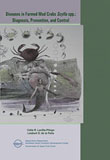Larval rearing of mud crab (Scylla): What lies ahead
| dc.contributor.author | Waiho, Khor | |
| dc.contributor.author | Fazhan, Hanafiah | |
| dc.contributor.author | Quinitio, Emilia T. | |
| dc.contributor.author | Baylon, Juliana C. | |
| dc.contributor.author | Fujaya, Yushinta | |
| dc.contributor.author | Azmie, Ghazali | |
| dc.contributor.author | Wu, Qingyang | |
| dc.contributor.author | Shi, Xi | |
| dc.contributor.author | Ikhwanuddin, Mhd | |
| dc.contributor.author | Ma, Hongyu | |
| dc.date.accessioned | 2018-05-16T06:23:05Z | |
| dc.date.available | 2018-05-16T06:23:05Z | |
| dc.date.issued | 2018 | |
| dc.identifier.citation | Waiho, K., Fazhan, H., Quinitio, E. T., Baylon, J. C., Fujaya, Y., Azmie, G., Wu, Q., Shi, X., Ikhwanuddin, M., & Ma, H. (2018). Larval rearing of mud crab (Scylla): What lies ahead. Aquaculture, 493, 37–50. https://doi.org/10.1016/j.aquaculture.2018.04.047 | en |
| dc.identifier.issn | 0044-8486 | |
| dc.identifier.uri | http://hdl.handle.net/10862/3289 | |
| dc.description.abstract | The increasing global demand for mud crabs (genus Scylla) and threats to the wild populations highlight the urgency of fully rearing them in captivity. Despite considerable progress in mud crab production, most crab farms still rely heavily on wild-caught crablets and juveniles while the low and inconsistent success rates of larviculture remain as the main bottleneck impeding the development of mud crab aquaculture. Over the years, numerous studies have been conducted to determine the optimum larval rearing parameters, the ontogenic changes in digestive function and feeding behaviour, and the diets for different larval stages. These data, however, are dispersed and not summarised to inform culture practices. This review provides an update on the current progresses and to pinpoint the gaps in knowledge regarding mud crab larval rearing. We include all four mud crab species under the genus Scylla, i.e. Scylla serrata, Scylla olivacea, Scylla tranquebarica and Scylla paramamosain. Knowledge compiled in this review serves as an important guideline for prospective mud crab larviculture. Future research should gear towards filling in the gaps in our knowledge to advance mud crab larval rearing, thus fully incorporating mud crab into the aquaculture sector. | en |
| dc.language.iso | en | en |
| dc.publisher | Elsevier | en |
| dc.subject | Scylla | en |
| dc.subject | Scylla serrata | en |
| dc.subject | Scylla olivacea | en |
| dc.subject | Scylla tranquebarica | en |
| dc.subject | Scylla paramamosain | en |
| dc.title | Larval rearing of mud crab (Scylla): What lies ahead | en |
| dc.type | Article | en |
| dc.identifier.doi | 10.1016/j.aquaculture.2018.04.047 | |
| dc.citation.volume | 493 | |
| dc.citation.spage | 37 | |
| dc.citation.epage | 50 | |
| dc.citation.journalTitle | Aquaculture | en |
| dc.subject.asfa | crab culture | en |
| dc.subject.asfa | rearing techniques | en |
| dc.subject.asfa | larvae | en |
| dc.subject.asfa | aquaculture | en |
| dc.subject.scientificName | Scylla serrata | en |
Files in this item
| Files | ขนาด | รูป | View |
|---|---|---|---|
|
There are no files associated with this item. |
|||
รายการนี้ปรากฏใน (s)
-
Journal Articles [1261]
These papers were contributed by Department staff to various national and international journals.



